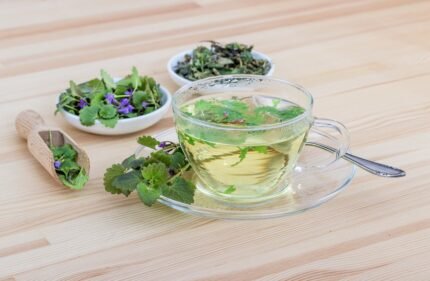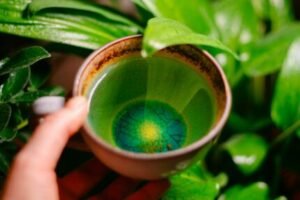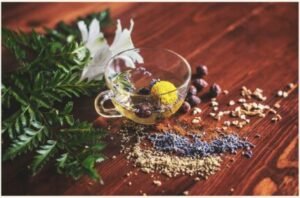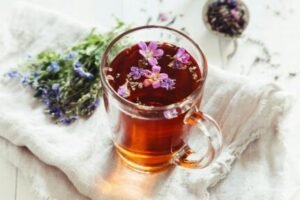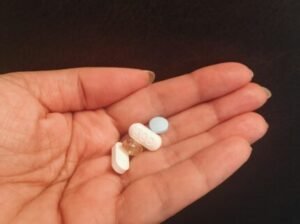Medically reviewed by Dr. Ramesh Gaddam, M.D. — Written by Sumalatha, D.N.H.E
Herbal teas have been enjoyed for centuries for their soothing taste and natural health benefits.
Made from dried leaves, flowers, seeds, or roots, these teas offer more than just flavor.
They are packed with nutrients that can support your health in many ways.
Whether you’re looking to relax, boost your immune system, or improve digestion, there’s a herbal tea for you.
In this article, we’ll explore 10 amazing health benefits of adding herbal teas to your daily routine.
1. Rich Source of Antioxidants
Herbal teas are full of antioxidants, which help protect your body from damage caused by free radicals.
These harmful molecules can lead to aging and health problems.
Teas like green tea and rooibos are especially good at fighting free radicals.
Drinking these teas regularly may help your body stay healthy and slow down signs of aging.
2. Supports Digestive Health
Many herbal teas, like peppermint and ginger, are great for digestion.
They can soothe the stomach, reduce bloating, and help ease indigestion.
Peppermint tea is often used to calm an upset stomach, while ginger tea can reduce nausea.
Adding these teas to your day can support a healthy digestive system.
3. Boosts Immune System
Certain herbal teas, such as echinacea and elderberry, can help boost your immune system.
These teas are packed with vitamins and compounds that support your body’s defenses.
Drinking them regularly may help protect you from colds, flu, and other illnesses.
They can be a natural way to stay healthy, especially during flu season.
4. Aids in Stress Relief and Relaxation
Herbal teas like chamomile and lavender are known for their calming effects.
They can help reduce stress and anxiety, making you feel more relaxed.
Chamomile tea, in particular, is often used before bed to promote a sense of calm.
Drinking these teas can be a simple way to unwind after a long day.
5. Promotes Better Sleep Quality
If you have trouble sleeping, herbal teas like valerian root and passionflower can help.
These teas have natural calming properties that make it easier to fall asleep and stay asleep.
Drinking a cup before bed can help you relax and improve your overall sleep quality.
Better sleep leads to feeling more refreshed during the day.
6. Supports Heart Health
Herbal teas such as hibiscus and Hawthorn can benefit your heart.
Hibiscus tea is known to help lower blood pressure, while Hawthorn may support healthy cholesterol levels.
Drinking these teas regularly can be part of a heart-friendly lifestyle.
They’re a natural way to help keep your heart healthy.
7. Anti-inflammatory Properties
Herbal teas like turmeric and cinnamon are known for their anti-inflammatory effects.
They can help reduce swelling and discomfort in the body.
Drinking these teas regularly may help soothe conditions related to inflammation, such as joint pain.
They provide a natural way to help your body heal.
8. Enhances Mental Clarity and Focus
Certain herbal teas, like ginkgo biloba and ginseng, are believed to boost mental focus.
These teas may help improve memory and concentration, making it easier to stay sharp.
Ginkgo biloba is often used to support brain function, while ginseng can provide an energy boost.
They’re perfect for when you need to focus or think clearly.
9. Improves Skin Health
Herbal teas like dandelion and nettle can support healthy skin.
They help clear out toxins and promote a clearer, more glowing complexion.
Some teas are known to help with acne or other skin issues.
Adding these teas to your diet can be a simple way to care for your skin naturally.
10. Supports Weight Management
Herbal teas such as green tea and mate can aid in weight management.
They help boost metabolism, which makes it easier to burn calories.
Some teas can also reduce appetite, helping you manage cravings.
Drinking these teas regularly can support your weight loss goals in a natural way.
Herbal Teas Nutrition
| Herbal Tea | Key Nutrients | Calories per 8oz (240ml) | Health Benefits |
|---|---|---|---|
| Green Tea | Antioxidants (catechins), Vitamins C, E, B | 0-2 | Supports weight loss, boosts brain function, heart health |
| Peppermint Tea | Menthol, Flavonoids | 0 | Aids digestion, reduces bloating, relieves headaches |
| Ginger Tea | Gingerol, Vitamins C, B6 | 5 | Reduces nausea, supports digestion, anti-inflammatory |
| Chamomile Tea | Antioxidants (apigenin), Calcium | 0-2 | Promotes relaxation, improves sleep, reduces anxiety |
| Hibiscus Tea | Vitamin C, Antioxidants | 0-2 | Lowers blood pressure, supports heart health |
| Rooibos Tea | Antioxidants (aspalathin), Iron | 0-2 | Reduces oxidative stress, supports skin health |
| Echinacea Tea | Polyphenols, Antioxidants | 0 | Boosts immune system, helps fight colds |
| Lavender Tea | Linalool, Antioxidants | 0-2 | Reduces anxiety, promotes relaxation and better sleep |
| Turmeric Tea | Curcumin, Vitamin C | 0-5 | Anti-inflammatory, supports joint health |
| Nettle Tea | Iron, Vitamin C, Calcium | 0-2 | Supports skin health, reduces inflammation, detoxifying |
Mechanisms of Action
Antioxidants Combat Oxidative Stress:
Herbal teas are packed with antioxidants, which help protect the body from oxidative stress.
Free radicals, harmful molecules that cause cell damage, are neutralized by these antioxidants, reducing their negative effects.
Reducing Inflammation:
Herbal teas like turmeric contain bioactive compounds such as curcumin, which are known for their anti-inflammatory properties.
These compounds can help reduce swelling, pain, and discomfort caused by inflammation.
Supporting Immune Function:
Certain herbal teas, like echinacea, are known to boost the immune system.
The natural compounds in these teas support the body’s defenses, helping it fight off infections and illnesses more effectively.
Research Evidence
Various studies highlight the health benefits of herbal teas.
For example:
- Green tea has been linked to lower risks of heart disease and improved weight management.
- Hibiscus tea has been shown to help lower blood pressure in some studies.
- Ginger tea is often recommended for easing nausea and improving digestive health.
Despite these promising findings, many of the studies are small or based on lab results.
More extensive human trials are needed to confirm the benefits of herbal teas, particularly for long-term use.
Safety Considerations
Potential Interactions with Medications:
- Hibiscus tea: May lower blood pressure, which could interact with diuretics or medications for hypertension.
- Green tea: Contains caffeine, which may interfere with certain medications or cause side effects like anxiety or insomnia if consumed in large amounts.
Allergic Reactions:
- Chamomile tea: May cause allergic reactions in people sensitive to pollen, especially those allergic to ragweed or other similar plants.
Recommended Consumption Limits:
It’s generally safe to drink 2-3 cups of herbal tea a day.
Excessive consumption may cause side effects like headaches, stomach irritation, or interactions with medications.
Always consult with a healthcare provider if you are pregnant, nursing, or on medications before consuming herbal teas regularly.
Conclusion
Frequently Asked Questions (FAQs)
What Are the Benefits of Herbal Tea?
Herbal teas offer many health benefits.
They can help improve digestion, reduce stress, and support the immune system.
Some teas, like green tea, are rich in antioxidants, which protect the body from damage.
Others, like chamomile and lavender, help you relax and sleep better.
Herbal teas are also low in calories, making them a healthy beverage choice.
Is It Healthy to Drink Herbal Tea Every Day?
Yes, drinking herbal tea daily can be healthy. Many herbal teas contain nutrients and antioxidants that support overall health.
However, it’s important to drink in moderation, usually 2-3 cups per day.
Some teas may interact with medications or cause side effects if consumed in large amounts, so it’s best to choose a variety of teas and consult a doctor if you have any health concerns.
Which Herbal Teas Are the Healthiest?
Some of the healthiest herbal teas include:
- Green tea: Packed with antioxidants, supports heart health and weight loss.
- Peppermint tea: Soothes digestion and reduces bloating.
- Ginger tea: Helps with nausea and inflammation.
- Chamomile tea: Promotes relaxation and better sleep.
- Hibiscus tea: Helps lower blood pressure and supports the immune system.
How Many Cups of Herbal Tea a Day?
Most people can safely drink 2-3 cups of herbal tea a day.
This amount allows you to enjoy the health benefits without the risk of side effects.
It’s important to listen to your body and avoid overconsumption, especially of teas with caffeine or strong effects like green tea or peppermint.
Is Tea Good for Your Liver?
Yes, certain herbal teas like green tea and dandelion tea may support liver health.
They contain compounds that help the liver detoxify and reduce inflammation.
However, too much tea, especially with caffeine, can put extra stress on the liver, so it’s best to drink in moderation.
What Are the Side Effects of Tea?
While most herbal teas are safe, some can cause side effects if consumed in large amounts. Possible side effects include:
- Stomach upset or nausea.
- Headaches from caffeine-containing teas.
- Allergic reactions (e.g., chamomile for pollen-sensitive individuals).
- Interaction with medications (e.g., hibiscus with blood pressure meds).
Can Tea Reverse Fatty Liver?
Drinking certain herbal teas, like green tea or dandelion tea, may help support liver function and reduce fatty liver symptoms.
While tea alone cannot reverse fatty liver, it can be part of a healthy diet and lifestyle that supports liver health.
What Tea Is Good for Kidneys and Liver?
Herbal teas like dandelion tea and green tea are often recommended for supporting both kidney and liver health.
Dandelion tea helps detoxify and cleanse these organs, while green tea provides antioxidants that reduce inflammation and protect against damage.
Is Tulsi Good for Kidneys?
Yes, Tulsi tea (also known as holy basil) is considered good for kidney health.
It helps reduce inflammation, supports detoxification, and can promote kidney function.
Tulsi tea is also known for its calming and immune-boosting properties.
What Tea Is Best for Organs?
For overall organ health, herbal teas like dandelion tea, green tea, and ginger tea are excellent choices.
Dandelion supports liver and kidney function, green tea provides antioxidants for heart health, and ginger tea reduces inflammation in various organs.
Can We Drink Tea Every Day?
Yes, it is generally safe to drink tea every day.
Herbal and regular teas contain beneficial compounds like antioxidants and can support overall health.
However, it’s best to drink in moderation, around 2-3 cups per day, to avoid potential side effects like digestive discomfort or caffeine-related issues.
Is Tea Good for Skin?
Yes, certain teas, like green tea and chamomile tea, are great for skin health.
They contain antioxidants and anti-inflammatory properties that can reduce skin redness, help with acne, and improve overall skin tone.
Drinking tea regularly can also keep your skin hydrated.
What Is the Power of Tea?
The power of tea lies in its rich antioxidants, vitamins, and bioactive compounds.
These components help reduce inflammation, support heart health, boost immunity, and promote relaxation.
Tea can be a simple, natural way to improve well-being and prevent health problems.
Which Tea Is Good for Health?
Some of the best teas for health include:
- Green tea: Full of antioxidants, supports weight loss and heart health.
- Chamomile tea: Helps with sleep and relaxation.
- Peppermint tea: Soothes the stomach and improves digestion.
- Ginger tea: Reduces nausea and inflammation.
What Is the Best Tea to Drink Every Day?
The best tea to drink daily depends on your needs.
Green tea is a great all-around option due to its antioxidants and health benefits.
Chamomile tea is ideal for relaxation and better sleep, while peppermint tea is good for digestion.
Choose a tea that suits your personal health goals.
Why Is Tea So Healthy?
Tea is healthy because it is full of antioxidants, vitamins, and other bioactive compounds that support the body in different ways.
It can help reduce inflammation, improve heart health, support digestion, and promote relaxation.
Many teas are also caffeine-free and low in calories, making them a healthy beverage choice.
What Are the Side Effects of Tea?
Some potential side effects of tea include:
- Digestive issues: Drinking too much tea can cause stomach discomfort or acid reflux.
- Caffeine-related effects: If the tea contains caffeine, it may lead to headaches, anxiety, or insomnia.
- Allergic reactions: Some teas, like chamomile, may cause allergic reactions in people sensitive to certain plants.
Is Tea an Antioxidant?
Yes, many teas, especially green tea, are rich in antioxidants.
These antioxidants help neutralize free radicals in the body, protecting cells from damage and supporting overall health.
Is Tea Good for Your Stomach?
Yes, certain teas, like peppermint and ginger tea, are excellent for the stomach.
They help soothe digestive issues, reduce bloating, and improve overall digestion.
However, strong teas or those with caffeine may irritate the stomach for some people.
Is Tea a Probiotic?
Tea itself is not a probiotic, but kombucha, a type of fermented tea, contains probiotics.
Probiotics are beneficial bacteria that support gut health.
Drinking kombucha can help maintain a healthy digestive system.
Can Tea Reduce Tummy?
Certain teas, like green tea and peppermint tea, may help reduce belly fat.
Green tea contains compounds that boost metabolism, while peppermint tea helps improve digestion, which can lead to a flatter stomach over time.
Is Tea Better on an Empty Stomach?
Drinking tea on an empty stomach may cause some people to feel nauseous or experience stomach irritation, especially with caffeinated teas.
It’s usually better to have tea after a meal or with a light snack to avoid discomfort.
What Is the Best Time to Drink Tea?
The best time to drink tea depends on the type:
- Morning: Green tea or black tea to boost energy.
- Afternoon: Peppermint or ginger tea to aid digestion.
- Evening: Chamomile or lavender tea to help relax and improve sleep.
Is It Okay to Drink Tea Every Day?
Yes, it is perfectly fine to drink tea every day, as long as you don’t overconsume and choose teas that suit your health needs.
Herbal teas without caffeine can be enjoyed several times a day without issue, while caffeinated teas should be consumed in moderation.
How to Drink Herbal Tea?
To enjoy herbal tea:
- Boil water and pour it over the tea leaves or tea bag.
- Let it steep for 5-10 minutes, depending on the tea type.
- Strain or remove the tea bag and enjoy your tea warm or cold.
- You can add honey or lemon for flavor, but many herbal teas taste great on their own!
Also Read:
10 Evidence-Based Benefits of Mamaki Tea (Hawaiian)
Are Bean Sprouts a Super Food? (15 Health Benefits)
Is it Healthy to Take Berocca Daily Year-Round?
Is It Ok To Take Vitamin Supplements Every Day? (5 Facts)
Is It Ok to Eat Cheese at Night? (Before Bed)
7 Surprising Health Benefits of Eating Oysters Daily!
Rhodiola: Is it okay to take Rhodiola Rosea Every Day?
Medically reviewed by Dr. Ramesh Gaddam, M.D.

General Physician, Diabetologist, and Critical Care Specialist.
Discover more from Health Build-Up
Subscribe to get the latest posts sent to your email.
